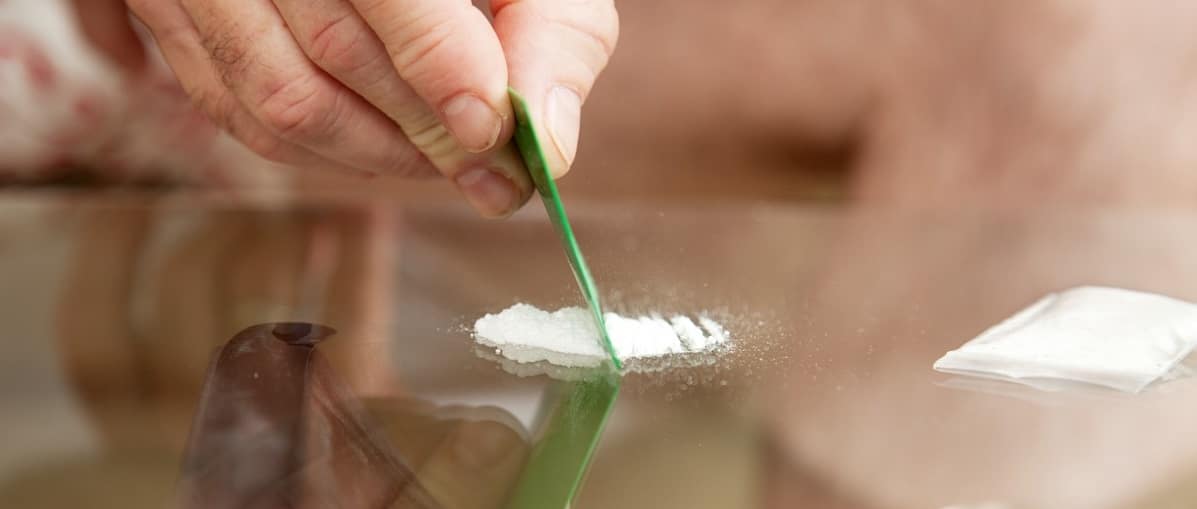What Makes Cocaine So Addictive? Why Its Hard To Resist

Cocaine is a potent stimulant that is harmful and typically snorted as a white powder. It can have various negative impacts and cause an extremely potent “high,” which may encourage drug abuse until they become addicted to cocaine.
This post explores the impacts on cocaine users’ lives, the reasons why it is so addictive, and the expert cocaine addiction treatment options available.
What is Cocaine Addiction?
One of the most addictive illegal narcotics available is cocaine, which causes users to have strong desires for more. Due to the way cocaine activates the brain’s pleasure and reward centres, the desire to consume more of the drug is quite strong and can occur almost immediately. In addition, tolerance to cocaine can form quickly, requiring more of the drug to provide the same level of ecstasy. Even though not everyone who uses the chemical will become hooked, some people may do so even after just one use.
Cocaine is a very addictive substance. The symptoms of addiction include craving cocaine and ignoring the negative effects that come with it. You are more likely to become dependent on something the longer you use it. Once you start using cocaine frequently, you could find it difficult to stop. As the effects of the drug wear off on your body, you need increasing doses to achieve the same results. At some point, you could need a lot of the drug to get by on a daily basis. The most challenging aspect of quitting cocaine is frequently your psychological dependence. It can be quite difficult to stop using cocaine if someone becomes addicted. This is due to cocaine’s excessive elevation of dopamine levels, which eventually rewires the brain’s reward system.
Cocaine Dependence vs Addiction
The reward system in the brain is thought to change as a result of addiction, which causes compulsive seeking and the use of intoxicating substances.
Those who struggle with addiction frequently develop a physical dependence on a drug along with mental changes. Dependence requires adjustments to the brain’s neurotransmitter release mechanism. The brain is less likely to maintain this release process on its own as a drug releases more serotonin, dopamine, or other neurotransmitter combinations and will start to require the drug’s presence to reach balance.
Why is cocaine so addictive?
For many people, cocaine is extremely addictive for a variety of reasons. This is mainly because it provides users with a high, particularly those who take it frequently. Dopamine builds up in the brain as a result of prolonged cocaine usage, resulting in pleasurable experiences. Additionally, it can make users feel more self-assured, and because cocaine acts quickly, it’s simple to develop a dependence on it. More information on what makes cocaine so addictive can be found below.
Positive reinforcement
Cocaine addiction, like many other addictions, frequently arises as a result of a psychological mechanism called “positive reinforcement.” By rewarding a behaviour, positive reinforcement encourages the development of a pattern of behaviour. When it comes to cocaine, using the substance frequently results in a number of outcomes that people believe to be advantageous. Dopamine, the brain’s “happy chemical,” is released when cocaine stimulates important pleasure centres in the brain, which might make you feel:
- Excited
- Wide awake
- Energetic
- Alert
- Happy
- Confident
- Chatty
- Euphoric
Many people want to take cocaine again, so they may keep feeling these “pleasant” or “good” sensations, which is why they find it so appealing. They might then become dependent on cocaine as a result of this.
A brief but intense ‘high.’
Coke frequently produces a short-lived but extremely powerful high. The effects of cocaine typically begin to take action 5 to 30 minutes after you inhale it, and they persist for 20 to 30 minutes on average. Because the high and those mentioned above “pleasant” benefits are so strong, when they pass after about 30 minutes, a person may feel the need to consume more cocaine to rekindle the pleasant effects as quickly as possible.
As a result, tolerance to cocaine increases very quickly, intensifying the “comedown” or cocaine withdrawal. This means that to get the desired benefits, users need to consume increasing amounts of cocaine more frequently. Thus, this can feed their cocaine addiction even more.
Cocaine tolerance can increase quickly, leading to the use of higher amounts.
Tolerance to cocaine rapidly increases with continued use. The end outcome can be that somebody uses more cocaine each time to get the same high. The drug may even start to be used more regularly during the week.
A key factor in the emergence of a substance use problem is drug tolerance. Cocaine dependence can manifest as both physical and mental dependence. Both the body and the brain appear to crave the drug. A person could also feel pressured to use the substance to cope with stressful events at work or in social settings.
Mixing with other addictive drugs
Cocaine is frequently combined with other drugs like heroin, amphetamines, or alcohol, all of which have their own negative effects, one of which increases the tolerance to both drugs when combined. This may make you want to use cocaine more frequently until you become dependent on it to operate because it will boost the positive reinforcement you receive when using cocaine.
Cocaine experimentation is frequently done in settings where other drugs are also being taken. Because of this, many individuals addicted to cocaine may also be dependent on alcohol or marijuana. This practice, known as poly-drug use, is particularly risky because it raises the possibility of a lethal overdose.
Cocaine and alcohol are regularly used together, to the point that alcohol might be a trigger for cocaine addicts in recovery. This makes it crucial to refrain from using any drugs while in rehabilitation. Among all drug combos that contain cocaine, using heroin and cocaine together is referred to as a “speedball” and is undoubtedly the most deadly.
Avoiding withdrawal symptoms
Like many drugs, stopping cocaine or being unable to obtain it can cause various withdrawal symptoms. These may consist of:
- Fatigue
- Intense nightmares
- Irritability
- Anxiety
- Depression
- Paranoia
- Intense drug cravings
These unpleasant and upsetting symptoms, which are commonly referred to as a “crash,” may cause people to desire to continue using cocaine in order to prevent the physical and mental collapse they suffer when they quit. Therefore, they are more susceptible to addiction because of this continual cycle of cocaine abuse.
What are the symptoms and effects of cocaine addiction?
It’s critical to recognise the apparent signs and symptoms of cocaine addiction if you believe that you or someone you know may have a problem with cocaine misuse.
It’s crucial to understand that while cocaine can have many effects that may appear great to some people, it can also have a number of negative symptoms and long-term ramifications. These may consist of:
- Anxiety
- Paranoia
- Psychosis
- Mood swings
- Panic Attacks
- Insomnia
- Overconfidence (resulting in risky behaviours)
- Agitation and restlessness
- Feeling that cocaine has complete control over one’s life
- Lying about your whereabouts and activities (including to loved ones)
- Stealing to pay for cocaine
- Elevated body temperate
- Erectile dysfunction in men (this might lead to Viagra abuse)
- High heart rate
- Nausea and vomiting
- Increased blood pressure
- Uncomfortable sweating
- Cognitive impairment
- Frequent nosebleeds (for snorting cocaine regularly)
- Liver and kidney damages
- Heart attack
- Stroke
- Breathing issues
Cocaine addiction treatment
Addiction to cocaine is a major issue. It may negatively affect many various aspects of your life, including your physical and mental well-being. The most crucial step is to get help, but the good news is that cocaine addiction is treatable and that you can regain your life back.
The importance of treatment for cocaine addiction recovery must be emphasised. A medically supervised detox is an initial step that can help a patient prepare for a residential programme. Group therapy and individual therapy are the following essential components of treatment for those who abuse cocaine.
Inpatient treatment is especially beneficial for those whose substance abuse is linked to mental health issues. The care for a patient with anxiety, depression, post-traumatic stress disorder, or another mental health issue is provided by dual diagnosis treatment. The likelihood of maintaining recovery after a stay in a residential facility can be improved by treating both substance use and mental health concurrently in an integrated programme.
At Compare Rehab UK, we are able to help to get professional cocaine rehab through a network of hospitals, clinics, and wellness centres that cater to those with addictions.
Programs for the treatment of cocaine addiction may provide:
- A free, no-obligation addiction assessment that gives you the opportunity to speak with one of our addiction treatment specialists about your specific difficulties and gain an idea of the process of going through addiction treatment.
- Medically assisted withdrawal detoxification – is the process of removing all traces of cocaine from your system in a supervised setting. Professionals will work to make this process as comfortable as we can for you while also assisting you in minimising withdrawal symptoms.
- Options for treatment include residential, day-care, or outpatient care, depending on the level of help you require for your cocaine addiction.
- Programmes for individual 1:1 treatment, family therapy, and group therapy.
- A variety of treatment modalities, such as mindfulness and cognitive behavioural therapy (CBT).
- Access to 12-Step support groups both on- and off-site.
- Free aftercare for 12 months following treatment (depending on the chosen organisation/aftercare is provided for life following treatment at some organisations).
- Free family assistance for 12 months following therapy (depending on the chosen organisation; other organisations provide family support for life following treatment).
Please contact us for additional information on the various specialised addiction treatments. I you’re worried about your cocaine use, call us now on 0800 999 1083 for confidential help.





